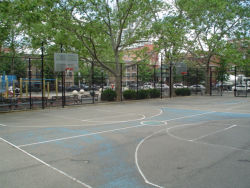Bedford Playground
Bedford Playground
Located on the southeast corner of Bedford Avenue and South 9th Street, this playground takes its name from the avenue running along its west side. The term Bedford has three possible origins. English settlers may have used the name in tribute to the Duke of Bedford, or for Bedfordshire County in England. Since the area was first settled by the Dutch in 1662, the word Bedford might also be an Anglicized form of the Dutch word Bestevaar, a Dutch translation of a Native American word meaning “old men,” or “place where old men meet.”
Bedford Playground lies in the neighborhood of Williamsburg. The community, in turn, is named for the (and future Superintendent of the United States Military Academy at West Point) Colonel Jonathan Williams (1750-1815) who initially surveyed this area. For much of the nineteenth century, Williamsburgh (as it was then spelled) was a relatively rural farming community along the East River. In 1818, entrepreneur David Dunham (ca. 1790) launched a steam ferry service to Manhattan, spurring growth of the community. Ten years later, the area was incorporated as the Village of Williamsburgh. In the following decades, industry flocked to the waterfront. Williamsburgh became so large that it was chartered as a city in 1852. Three years later, the City of Brooklyn annexed Williamsburg and dropped the final “h” from the community’s name. Soon after, Williamsburg became a fashionable suburb for wealthy professionals and industrialists from Brooklyn and Manhattan.
After the 1908 opening of the Williamsburg Bridge, the neighborhood’s population soared. The bridge allowed Eastern European immigrants—including Lithuanian, Polish, Italian, and Russian Orthodox newcomers—to leave the crowded Lower East Side of Manhattan for the relative expansiveness of Brooklyn. To accommodate the many new residents, the six-story tenements that are so prevalent in Williamsburg today were built, and many brownstone and wood-frame houses were quickly turned into multiple dwellings. By 1917, Williamsburg’s population had more than doubled.
In the late 1930s and early 1940s, Jewish immigrants fleeing Nazism came to the neighborhood. They formed Hasidic synagogues and schools. Today, there are more than 20 Hasidic sects in Wiliamsburg. The community is not entirely Hasidic—many African Americans live in Williamsburg, and since the 1960s, the Latin American presence in the neighborhood has been increasing.
Bedford Playground has as varied a history. Originally, the playground was located on the bank of the East River, at the intersection of Kent Avenue and South 8th Street—five blocks away from its current location. In 1910, the City of New York acquired the Kent Avenue and South 8th Street property (1.28-acres) for ferry services, vesting control in the Department of Plant and Structures. Twenty-one years later, the agency relinquished control over the land, and Parks assumed jurisdiction over the property in two separate stages in 1934 and 1937. In 1942, the city acquired additional parcels of land (now of indeterminate acreage), and assigned the property to Parks.
By 1950, the land had yet to be developed into a park. At the same time, the F. and M. Schaefer Brewing Company, which was located along the Williamsburg waterfront between South Eighth and Division Streets, was looking to consolidate its facilities. In 1951, the company offered the 0.881 acres it owned on Bedford Avenue and South 9th Street in exchange for the waterfront parkland that Parks owned. It also agreed to pay the difference between the costs of the two parcels of land. In 1956, the Board of Estimate adopted this proposal and transferred the new property to Parks. That same year, the playground opened to public. The parkland remained nameless, however, until 1987, when Parks Commissioner Henry J. Stern designated it Bedford Playground.
In 1999, City Council Member Victor L. Robles funded the $1.25 million reconstruction of the playground, the first major renovation since it was built in 1958. This complete overhaul of the park included improvements such as new perimeter fencing, sidewalk, lighting, play equipment with safety surfacing, spray showers, benches, and game tables. The basketball and handball courts were renovated, the water supply and drainage systems were updated, and animal art was added. Today, Bedford Playground offers a welcome place for rest and relaxation for people of all ages.
Check out your park's Vital Signs
Clean & Safe
Green & Resilient
Empowered & Engaged Users
Share your feedback or learn more about how this park is part of a
Vital Park System



